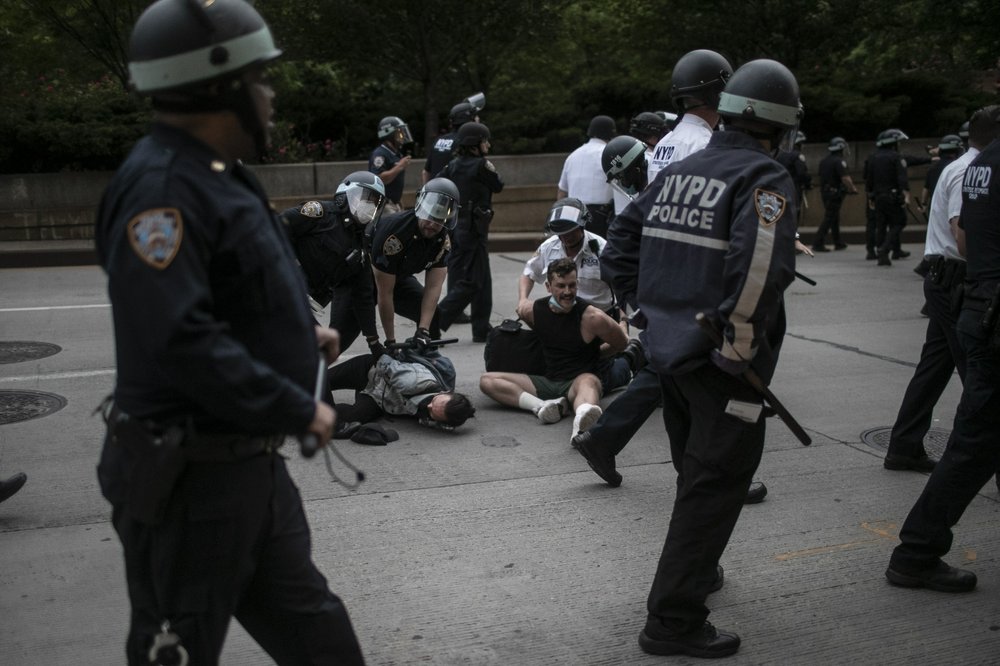By JAKE SEINER, BRIAN MAHONEY and DEEPTI HAJELA
An 8 p.m. curfew didn’t stop thousands of defiant demonstrators from marching through the streets of New York City throughout the night Tuesday, though some of the rampant destruction seen over the past few nights was quelled.
The citywide curfew, which is in place through Sunday and was moved earlier from the previous night, was instated to prevent the widespread damage and destruction that has filled the city’s streets over the last two nights after largely peaceful dayside protests.
Mayor Bill de Blasio doubled down on a citywide curfew, but rejected urging from President Donald Trump and an offer from Gov. Andrew Cuomo to bring in the National Guard.
“Everyone, time to go home so we can keep people safe,” he said on WINS-AM radio shortly after the curfew took effect.
But demonstrators continued winding through the streets, mostly in Manhattan and Brooklyn, as part of ongoing nationwide protests following the May 25 death of George Floyd and other recent racially charged killings.
“I’m surprised,” said Risha Munoz, on Manhattan’s Upper West Side, where at points they were greeted with cheers and horns by onlookers in building windows. “I didn’t think they were gonna let us go on, but we just kept on moving and we’re not stopping.”
Something has to break, and it’s not going to be us,” said Evan Kutcher, one of hundreds of demonstrators who stood outside the Barclays Center chanting Floyd’s name Tuesday evening.
Police began making arrests around 9 p.m. and shut down parts of the West Side Highway in lower Manhattan, blocking it off to huge crowds of protesters. The police department announced it would not allow vehicle traffic south of 96th Street in Manhattan after curfew, though residents, essential workers, buses and truck deliveries were exempt.
“We’re going to have a tough few days. We’re going to beat it back,” de Blasio, a Democrat, said.
Jane Rossi said she witnessed officers rip a man out of his car and arrest him in Chelsea around 10:45 p.m.
The car was behind a group of several hundred protesters that had roamed Manhattan peacefully since leaving Trump Tower at 8 p.m. Tensions had risen moments earlier when some in the group began trying to damage a bike rental station and banged on the windows of a JCPenny’s. The vast majority of the crowd moved to stop the them.
Officers surrounded the car and arrested the driver moments later.
“They were just driving behind the protesters making sure that we were safe,” Rossi said. “They were part of the protest.”
Just after midnight Wednesday, most of the city’s streets were cleared aside from police patrolling, especially in hot-spot areas for demonstrations in areas of Brooklyn and Manhattan. There was a heavy police presence in the Brooklyn neighborhood of Crown Heights, where authorities say police fatally shot a man after responding to reports of shots fired. NYPD Chief of Department Terence Monahan said the officer-involved shooting was not connected to the protests.
Protests continued in New York City and across the country Tuesday following the death of Floyd, a black man who died last week after a white Minneapolis police officer pressed a knee on Floyd’s neck even after he stopped moving and pleading for air.
While de Blasio insisted the city would put a stop to the violence and vandalism that have marred largely peaceful mass demonstrations surrounding Floyd’s death, both the Republican president and the Democratic governor laid into the city’s handling of the mayhem thus far.
“The NYPD and the mayor did not do their job last night,” Cuomo said at a briefing in Albany. “Look at the videos. It was a disgrace.”
He said the mayor was underestimating the problem and the nation’s largest police force wasn’t deployed in sufficient numbers, though the city had said it doubled the usual police presence.
Cuomo’s remarks infuriated Monahan, the New York Police Department’s highest-ranking uniformed member.. Officers are “giving their blood to keep this city safe,” he told the New York Post, adding that he’d been hit by a bike and bloodied himself while arresting suspects Monday night. Cuomo spokesman Richard Azzopardi later said the governor “has respect and confidence in the NYPD” and felt the mayor should put more officers on the streets.
Unprompted, Cuomo brought up the possibility of using his power as governor to replace the mayor and deploy the National Guard over de Blasio’s objections, then immediately shot down the idea as legally impractical and unnecessary.
On Twitter, Trump urged a 7 p.m. curfew and National Guard deployment in his native city.
The lowlifes and losers are ripping you apart. Act fast!” he wrote.
But de Blasio said the NYPD was “best equipped” to handle the lawbreaking, arguing that bringing in the National Guard risked fueling worse conflict in a city on edge.
“We will regret it if we bring outside armed forces,” he said. “When you bring in people not trained for the circumstance but still with loaded weapons and put under horrible stress, really bad things happen.”
The mayhem over the last four nights has challenged the 36,000-officer police force, which has a reputation as a muscular, well-resourced agency that has driven down crime and faced down terror threats in the nation’s biggest city.
On Monday night and early Tuesday, police again struggled to keep up with, let alone get ahead of, roving groups of people bashing their way into shops, including Macy’s flagship Manhattan store.
Nearly 700 people were arrested overnight, and several officers were injured. A sergeant was struck by a hit-and-run driver in the Bronx and was hospitalized in serious but stable condition, police said. Video also showed a group of people hitting a police officer with pieces of wreckage until he pulled his gun and they ran.
De Blasio said officials expected problems farther downtown, as had happened the night before, and “adjustments were made” once officials realized that the hot spots had shifted.





